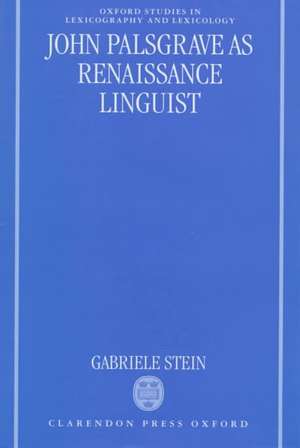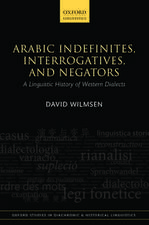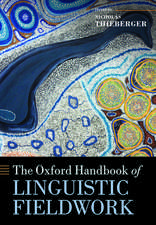John Palsgrave as Renaissance Linguist: A Pioneer in Vernacular Language Description: Oxford Studies in Lexicography and Lexicology
Autor Gabriele Steinen Limba Engleză Hardback – 17 iul 1997
Preț: 1467.47 lei
Preț vechi: 2229.73 lei
-34% Nou
Puncte Express: 2201
Preț estimativ în valută:
280.80€ • 293.92$ • 233.71£
280.80€ • 293.92$ • 233.71£
Carte tipărită la comandă
Livrare economică 19-25 martie
Preluare comenzi: 021 569.72.76
Specificații
ISBN-13: 9780198235057
ISBN-10: 0198235054
Pagini: 524
Ilustrații: tables
Dimensiuni: 163 x 243 x 34 mm
Greutate: 0.9 kg
Editura: OUP OXFORD
Colecția OUP Oxford
Seria Oxford Studies in Lexicography and Lexicology
Locul publicării:Oxford, United Kingdom
ISBN-10: 0198235054
Pagini: 524
Ilustrații: tables
Dimensiuni: 163 x 243 x 34 mm
Greutate: 0.9 kg
Editura: OUP OXFORD
Colecția OUP Oxford
Seria Oxford Studies in Lexicography and Lexicology
Locul publicării:Oxford, United Kingdom
Recenzii
I expected this book to be informative; it was also intriguing and wonderfully written./ Though much of the book, as readers should expect, is logically a detailed discussion of a specialized topic, Stein goes far beyond that. Her accomplishment is to show how ILesclarcissementI alone can be used as an historical witness to the age, taking Palsgrave's grammatical and lexicographical samples to illustrate contemporary society./ She has set a remarkable standard./ Alan Cottrell, Cottey College, Sixteenth Century Journal, Vol 30, no 1, 1999.
Gabriele Stein has carried on the banner and crowned her dedicated research with a remarkable book.
Immensely rich book ... it cannot be ignored by anyone concerned with the development of French and English in the medieval period ... well researched and perceptive, so that her readers can appreciate fully the remarkable degree of innovation that Palsgrave brought to all aspects of his task.
...the most comprehensive work yet published ... While focused primarily on one linguist, Stein's study treats topics which are applicable to other eras in the history of lexicography, and scholars from other disciplines of linguistics will gain much from it as well ... Stein provides an extensive bibliography which will facilitate the consultation of the literature on Lesclarissement and related topics. It is with her study that the prospective Palsgrave scholar should begin.
Stein, one of the few scholars competent to undertake the project ... has now certainly written the definitive book on the topic ... Stein has of course done much more than exploring just this one aspect: she has brought out Palsgrave's exceptional achievement and pointed to the rich sources available in his compilation for historical linguistics of several disciplines ... Gabriele Stein has carried on the banner and crowned her dedicated research with a remarkable book.
John Palsgrave's Lesclarcissement de la Langue Francoyse 1530 (LLF) is the first description of the French Language that has any claim to completeness. None of the works before it in any vernacular is comparable. Gabriele Stein's meticulous and richly detailed study, a model of scholarship that will not soon be equaled, accords this masterpiece and its author the respect they deserve. Palsgrave's contribution to lexiograpic practice in 16th Century England is in this volume treated with great skill and care. Stein has also presented the finest study to date of Palsgrave's predecessors. Her book is a model of meticulous scholarship, and extremely Valuable contribution to the history of lexiography and to the cultural history of Tudor England.
Gabriele Stein has carried on the banner and crowned her dedicated research with a remarkable book.
Immensely rich book ... it cannot be ignored by anyone concerned with the development of French and English in the medieval period ... well researched and perceptive, so that her readers can appreciate fully the remarkable degree of innovation that Palsgrave brought to all aspects of his task.
...the most comprehensive work yet published ... While focused primarily on one linguist, Stein's study treats topics which are applicable to other eras in the history of lexicography, and scholars from other disciplines of linguistics will gain much from it as well ... Stein provides an extensive bibliography which will facilitate the consultation of the literature on Lesclarissement and related topics. It is with her study that the prospective Palsgrave scholar should begin.
Stein, one of the few scholars competent to undertake the project ... has now certainly written the definitive book on the topic ... Stein has of course done much more than exploring just this one aspect: she has brought out Palsgrave's exceptional achievement and pointed to the rich sources available in his compilation for historical linguistics of several disciplines ... Gabriele Stein has carried on the banner and crowned her dedicated research with a remarkable book.
John Palsgrave's Lesclarcissement de la Langue Francoyse 1530 (LLF) is the first description of the French Language that has any claim to completeness. None of the works before it in any vernacular is comparable. Gabriele Stein's meticulous and richly detailed study, a model of scholarship that will not soon be equaled, accords this masterpiece and its author the respect they deserve. Palsgrave's contribution to lexiograpic practice in 16th Century England is in this volume treated with great skill and care. Stein has also presented the finest study to date of Palsgrave's predecessors. Her book is a model of meticulous scholarship, and extremely Valuable contribution to the history of lexiography and to the cultural history of Tudor England.















